On Page Vs Off Page SEO: Why They Both Are Equally Important (With Reasons)
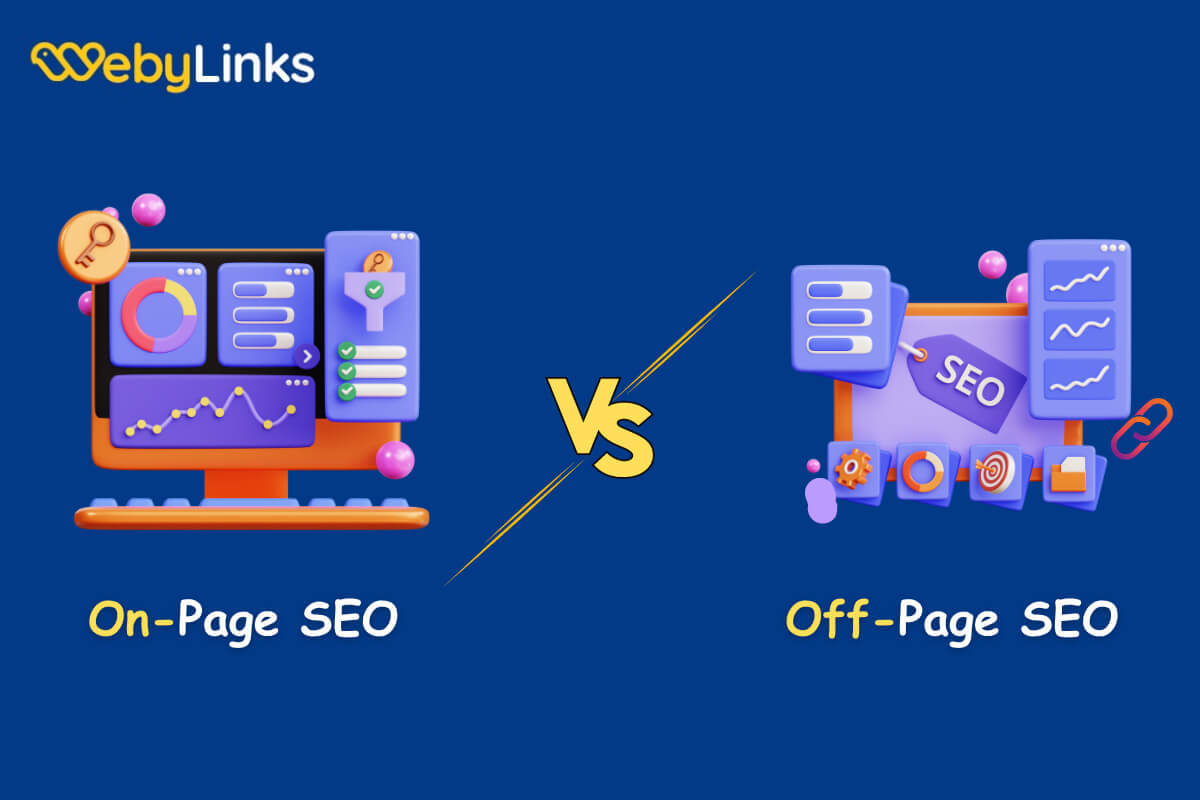
In the constantly evolving world of digital marketing, search engine optimization (SEO) is a pillar that is essential to the success of websites. Understanding the distinct functions and combined effects of On Page Vs Off Page SEO is critical as we go deeper into these domains. This investigation is not just about technical expertise; it’s also about developing a strategy that appeals to a dynamic online audience, especially students who are always following the newest technological developments.
The distinction between On-Page vs Off-Page SEO becomes critical when we get further into the subtleties of SEO. Regarding On Page SEO, elements like meta tags, keyword optimization, and high-quality content are essential for increasing a website’s exposure. In contrast, OffPage SEO includes techniques like influencer outreach, social media interaction, and link building that help a website appear more legitimate and authoritative to search engines.
Understanding On-Page SEO
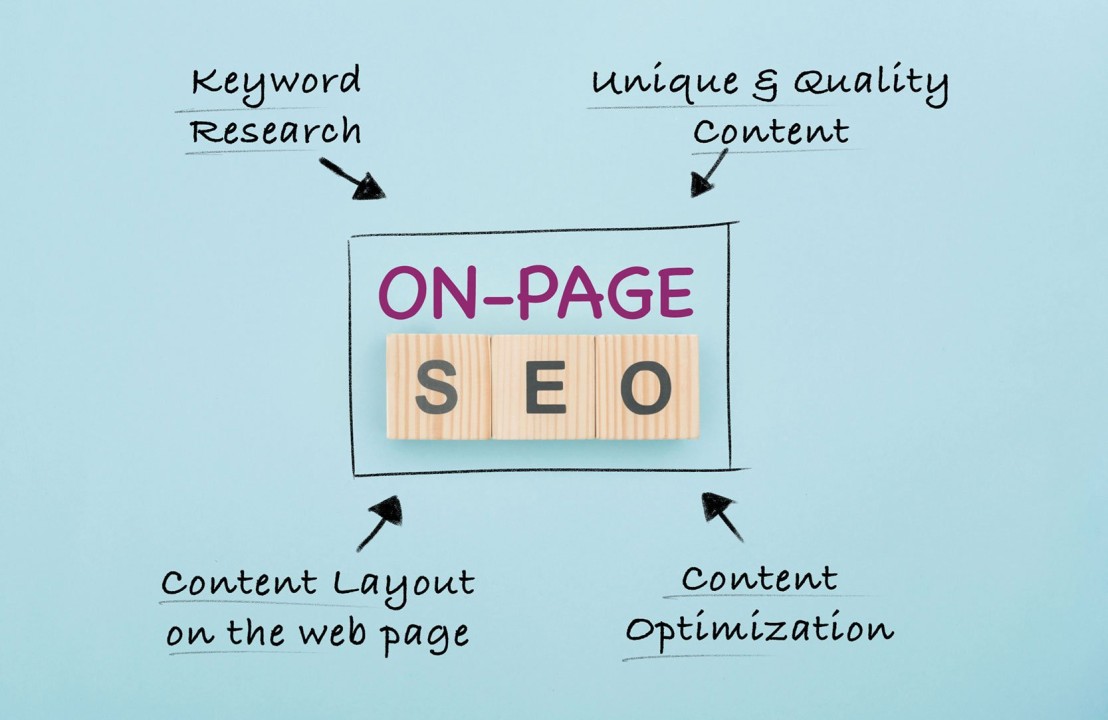
What is On-Page SEO?
Optimizing individual web pages to rank better in search engines is known as on-page SEO. It all comes down to making your material appealing and pertinent to your audience and being visible.
Key Elements of On Page SEO:
-
Content Quality:
Your website’s primary component. If your pages handle the nuances of onpage SEO vs. offpage SEO and offer relevant, high-quality content, they will rank better in search results and keep visitors engaged. -
Title Tags and Meta Descriptions:
These are your initial impressions in search engine results. Well-Written headlines and descriptions may raise your click-through rates considerably. -
Internal Linking and URL Structure:
A well-structured website with an apparent internal connection facilitates effective content navigation for users and search engines. -
Image Optimization:
Images that load quickly improve website performance and user experience, two critical aspects of retaining visitors. -
Mobile Responsiveness:
A mobile-friendly website is required since most internet users use mobile devices..
Advantages and Reasons for On Page SEO
- Control and Impact: You have direct control over on page SEO components so that you can improve your website now.
- Enhanced User Experience: An adequately optimized page keeps visitors interested, which lowers bounce rates and raises the possibility of conversions.
7 Reasons Why On-Page SEO is Crucial
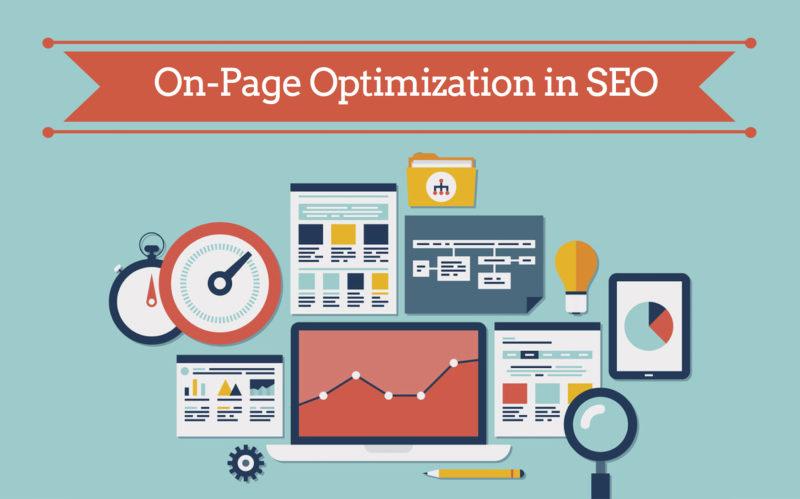
- Direct Impact on User Experience: Keeping the tech-savvy audience interested requires a well-optimized page with relevant information and easy-to-navigate navigation.
- Immediate Influence on Search Engine Indexing: By assisting search engines in comprehending and prioritizing your content, on-page SEO ensures that people looking for your expertise and services can find your website.
- Enhances User Engagement: On-page SEO aims to create material that appeals to your audience and search engines.
- Improves Website Usability: A well-structured website results from good on-page SEO. As a result, users will have a more seamless experience; finding information and interacting with your content will be simpler for visitors.
- Boosts Organic Search Visibility: Optimizing features like photos, meta tags, and keywords may make your website more apparent in organic search results. Greater visibility is essential to grow your visitor base without using paid advertising exclusively.
- Increases Website Speed and Performance: Optimizing your site’s technical features, such as load times and mobile responsiveness, is a part of On-Page SEO. Both visitors and search engines prefer websites that are quicker and more responsive.
- Aligns Content with Search Intent: On-page SEO assists you in matching the queries that your target audience is using to find your content. This alignment guarantees that your content fits your visitors’ demands and interests while boosting your search engine results.
Common Misconceptions and Challenges
- Myth: On-page SEO is solely focused on keyword placement.
- Reality: It covers much more ground, including your site’s technical issues, content quality, and user experience.
- Challenge: Keeping up with the ever-changing SEO trends and algorithm changes is challenging.
- Solution: Keep up with the latest developments in SEO and modify your tactics as necessary.
Best Practices and Tips
- On-Page SEO: Make sure your website loads quickly and is mobile-friendly. Use catchy, keyword-rich titles and meta descriptions.
- Off-Page SEO: Focus on building relationships to get high-quality backlinks, engage in social media, and submit thought-provoking content to other trustworthy websites, all while realizing the crucial connection between on-page and off-page SEO.
Understanding Off Page SEO
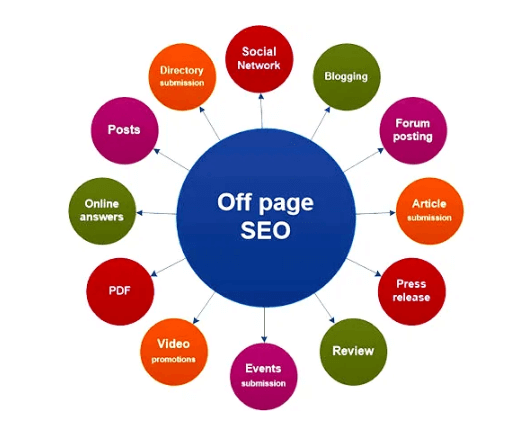
What is Off-Page SEO?
Off-page SEO refers to actions that happen outside your website but still impact your rankings. It entails using a range of outside techniques to build reputation and authority. It is essential to comprehend the differences between on-page vs off-page SEO to maximize your website’s functionality and exposure in search engine results. Examine the differences between SEO off-page and SEO on-page tactics and how they affect the overall performance of your web presence.
Key Elements of Off Page SEO:
- Backlinks: When evaluating Off page SEO, high-quality backlinks from reputable websites significantly boost your website’s reputation and are typically seen as endorsements.
- Social Media Engagement: Maintaining an active social media presence helps increase traffic and brand awareness.
- Guest Blogging: You may reach a wider audience and obtain reputable Niche Relevant Backlinks by contributing to other blogs.
- Brand Mentions: Positive mentions of your business across various channels enhance your online reputation and search engine optimization (SEO).
Advantages and Reasons for Off Page SEO
- Building Authority: Long-term success depends on Off-Page SEO’s ability to position your website as a reliable authority in your industry.
- Expanding Reach: You may reach a wider audience using guest blogging, social media marketing strategies, and on-page and off-page SEO methods. You understand the subtle differences between on vs. off-page SEO, which guarantees more planned and successful optimization for your website.
7 Reasons Why Off Page SEO is Essential
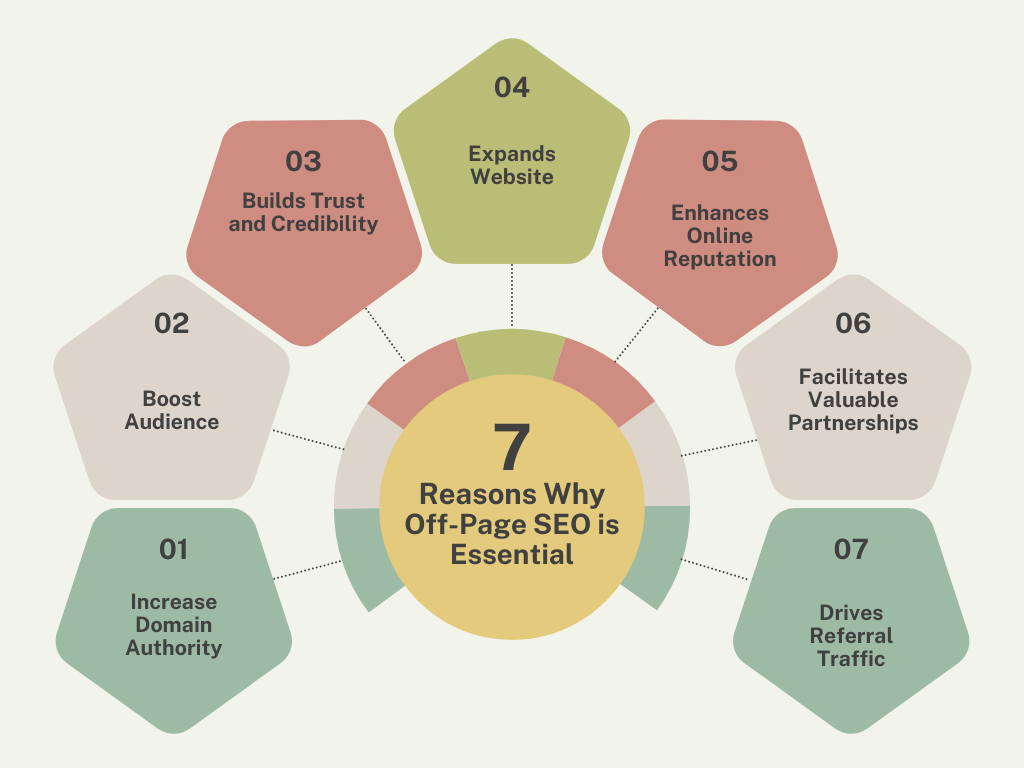
- Increase Domain Authority: Getting high-quality backlinks from other websites indicates to search engines that your website is a reliable and authoritative source, which is a prerequisite for better positions in search results.
- Boost Audience: It helps to boost the audience by increasing the visibility and presence of a website through external factors such as backlinks, social signals, guest blogging and online mentions. I
- Builds Trust and Credibility: Off-page SEO efforts, such as obtaining backlinks from reliable sites, aid in positioning your website as a respectable and authoritative resource in your industry. This is especially crucial in the case of instructional content, where credibility is crucial.
- Expands Website: Using techniques like guest blogging and social media marketing, Off-Page SEO enables you to reach a larger audience. This increased visibility is essential for increasing brand recognition and attracting new users to your website.
- Enhances Online Reputation: Considering your online reputation is a part of off-page SEO. Positive online mentions and reviews can dramatically increase your website’s perceived authority and worth.
- Facilitates Valuable Partnerships: Using Off-Page SEO can help you establish beneficial collaborations with influencers and other websites in your industry. These collaborations may open up fresh doors for development and visibility.
- Drives Referral Traffic: Not only may high-quality backlinks from other websites boost your SEO, but they also increase referral traffic. Since this traffic is frequently very focused, it may increase engagement and conversions.
Common Misconceptions and Challenges
- Myth: Better off page SEO is always correlated with more links.
- Reality: The quality of backlinks is more important than their quantity.
Best Practices and Tips
- For On-Page SEO: To ensure your website complies with Google’s ranking factors for on-page vs off-page SEO, focus on content optimization and keyword research.
- For Off-Page SEO: Develop connections with reputable websites to obtain high-quality backlinks for off-page SEO.
The Interplay Between On-Page and Off-Page SEO

Off-page and on-page SEO are crucial components of the SEO apparatus, addressing the question of “what is on-page vs off-page SEO?”. When combined, they offer a comprehensive and fruitful SEO strategy. For instance, your website’s authority and ranking potential are increased by naturally occurring backlinks (Off-Page) produced by excellent On-Page content. A complete digital marketing plan must combine on-page and off-page SEO methods. Understanding the subtle differences between on vs off page SEO guarantees more planned and successful optimization for your website.
FAQs On page vs Off Page SEO
To ensure your on-page SEO aligns with the most recent SEO best practices and your changing content strategy, check and update it regularly.
A solid On-Page SEO foundation is the first step in realizing the full potential of Off-Page SEO, while it can still offer some advantages.
That’s not all there is to it. It entails social media marketing, reputation development for your brand, and other things.
Conclusion
Ultimately, On-Page and Off-Page SEO essential components of a complete digital marketing plan rather than only stand-alone techniques. Together, they increase your website’s exposure, credibility, and user interaction. Realizing and implementing these SEO tactics will help instructors and students learn your web presence’s full potential.
Are you prepared to advance your website’s functionality? For specialized SEO services, go to WebyLinks. Our staff can assist you whether you require a thorough SEO plan, want to increase your Off-Page SEO efforts, or want to improve your On-Page SEO. Speak with us right now, and together, we’ll begin creating your SEO success story!
